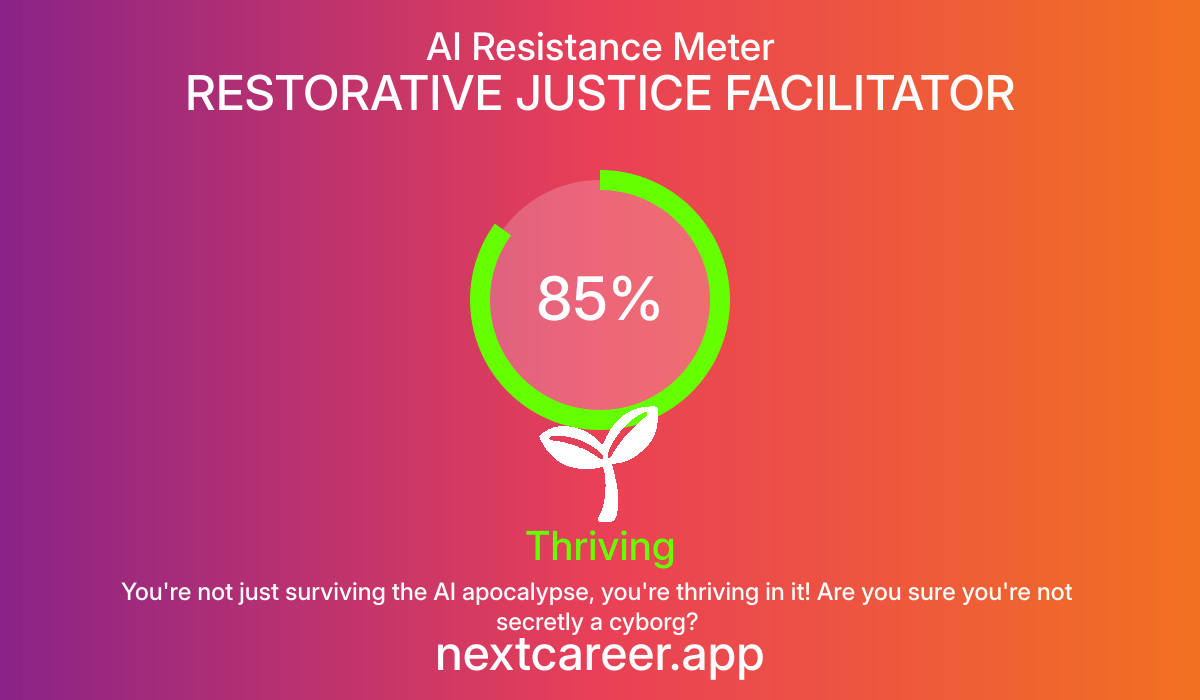AI Resistance for RESTORATIVE JUSTICE FACILITATOR
AI Resistance Score
AI Resistance Meter
Thriving
RESTORATIVE JUSTICE FACILITATOR
You're not just surviving the AI apocalypse, you're thriving in it! Are you sure you're not secretly a cyborg?
The role of a Restorative Justice Facilitator is highly resistant to AI due to its reliance on complex emotional intelligence, nuanced human interaction, and creative conflict resolution strategies, which are challenging for current and foreseeable AI technologies to replicate effectively. The human-driven elements of empathy, ethical decision-making, and societal influence play a crucial role in this position, demanding skills that go beyond algorithmic capabilities.
The role of a Restorative Justice Facilitator is highly resistant to AI due to its reliance on complex emotional intelligence, nuanced human interaction, and creative conflict resolution strategies, which are challenging for current and foreseeable AI technologies to replicate effectively. The human-driven elements of empathy, ethical decision-making, and societal influence play a crucial role in this position, demanding skills that go beyond algorithmic capabilities.
Key Factors
- Emotional Intelligence: The ability to understand and manage emotions is critical in mediating restorative justice processes, which remains a significant limitation of AI.
- Cognitive Tasks: While AI can assist with data processing and providing historical context, the complex decision-making involved requires human oversight.
- Creative Thinking: Developing innovative solutions to social conflicts requires creativity and adaptability beyond AI's current scope.
- Societal Shifts: An increasing focus on community-based and empathetic justice systems enhances the role's importance and resistance to AI displacement.
Human Advantages
- Empathy and emotional connection
- Complex problem-solving
- Ethical and moral judgment
- Cultural and social awareness
AI Vulnerabilities
- Data analysis and pattern recognition
- Administrative tasks such as scheduling or basic communication
Recommended Actions
- Enhance skills in emotional intelligence through continuous education and practice.
- Integrate AI tools to streamline administrative and data-related tasks, allowing more focus on human-intensive areas.
- Stay informed on advancements in justice technologies to leverage innovations that complement human facilitation.
- Promote community awareness and understanding of restorative justice to elevate its societal value and demand.
In the near-term, the role will experience growth and increased importance as society places greater value on empathetic and restorative approaches to justice. Long-term, the job may evolve with new technologies assisting facilitators in data analysis and process efficiency, yet maintaining its core human-driven elements. Potential paradigm shifts in justice systems may further emphasize restorative over punitive approaches, thus solidifying the need for skilled human facilitators.
